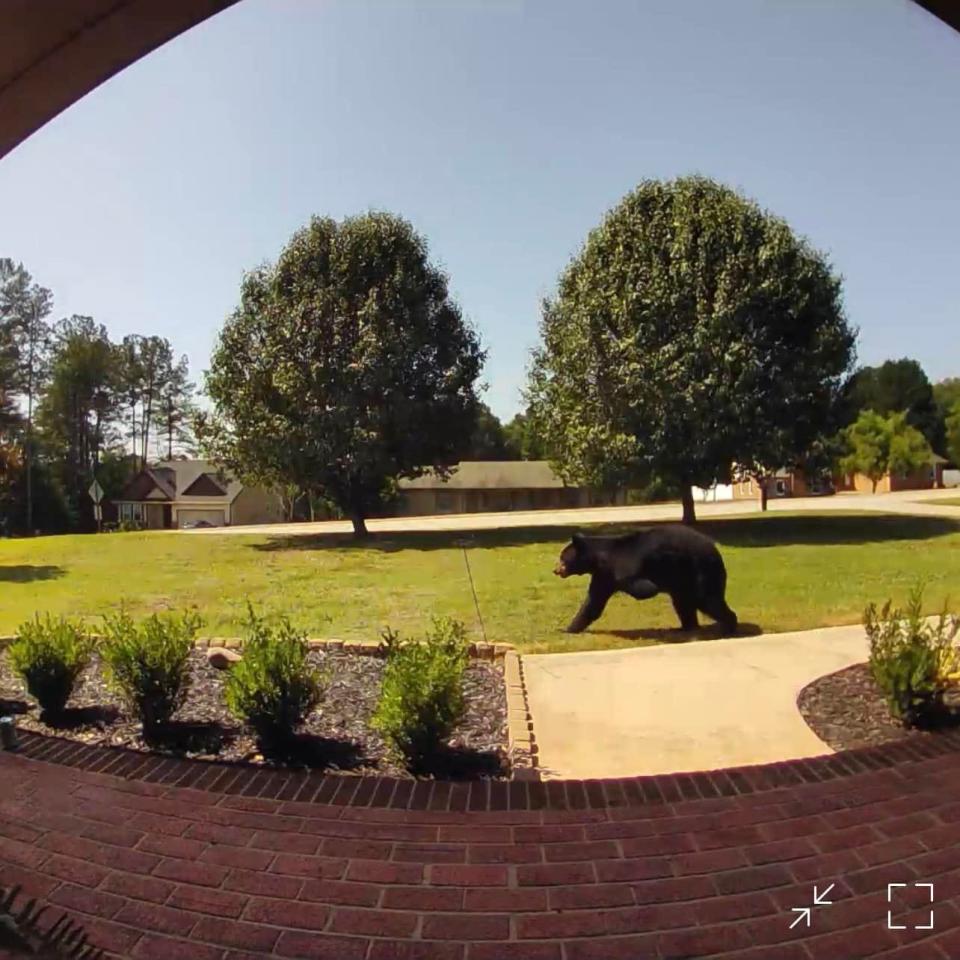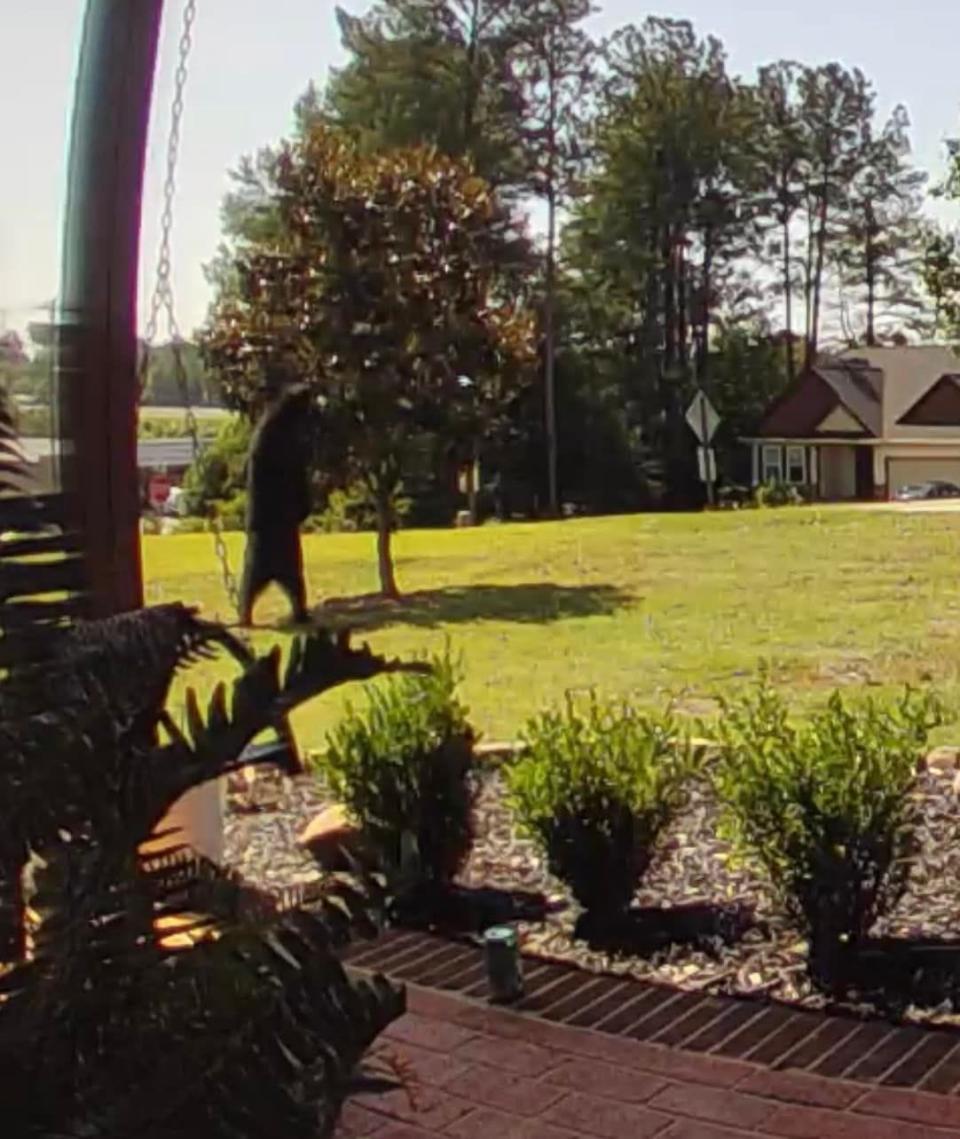Bears spotted in Spartanburg, Boiling Springs. Here's what to do if you encounter a bear.
Multiple black bears have recently been spotted in Spartanburg County, according to the South Carolina Department of Natural Resources (SCDNR) and the Spartanburg Police Department.
SCDNR was made aware of the incidents, according to the Region 1 (Piedmont) Office. Region 1 covers Oconee, Pickens, Greenville, Spartanburg, Anderson, Laurens, Abbeville, Greenwood, Union, Cherokee, McCormick and Edgefield Counties. Region 1 headquarters are in Clemson.
Mark Carroll of the SCDNR field office in Union said Wednesday that the situation resolved itself and that black bears are generally not confrontational.

One of the sightings was around 11:15 a.m. on the campus of Wofford College. The bear, believed to be a cub, was gone when animal control arrived in response, according to Dudley Brown of the Wofford College Office of Marketing and Communications.
The Wofford campus received text and email notifications alerting them of the bears' presence on campus at 11:31 a.m. Friday morning.
Social media posts, including firsthand accounts of sightings, circulated over the weekend.
Major Art Littlejohn of the Spartanburg Police Department said their reports stated, possibly, two different bears had been spotted at three different locations: at Wofford, nearby at Barnet Park and at Duncan Park near Union Street.
Ashley Burnside, of Parris Bridge Road in Boiling Springs, posted on Facebook Sunday about an injured bear in front of her house.

SCDNR: Bear sightings in Spartanburg 'extremely common'
Officials from the Region 1 Office said bear sightings in Spartanburg are "extremely common."
Although black bears are the largest land mammal in South Carolina, they are not generally considered dangerous, and attacks upon humans are relatively uncommon.
The upper piedmont and coastal plain regions of the state are considered to have a "sustainable population" of black bears, according to SCDNR's website. A "transient population" exists in most of the rest of the state, and Carroll said that there are bear sightings in every county in the state.
Although they are not generally threatening and prefer to stick to their natural habitat of large forest areas or wetlands, black bears are adaptable and can be found in a variety of habitats, according to SCDNR.
Carroll stated that he has seen an increase in bear sightings in his last ten years of working with DNR. While sightings are common in rural areas of the county, Carroll stated that his office gets 2-3 calls a year in response to sightings in more urban areas.
Human-bear contact should be avoided if at all possible. Black bears have excellent senses of smell, and Carroll emphasized that the highest priority for avoiding contact is proper storage of food, trash, birdfeeders and anything that emits a smell that could attract bears.
Here are some SCDNR tips to avoid unwanted encounters with bears:
Birdfeed and feeders: If a bear starts getting into your bird feeders, take the feeders down and put them away for a while; the bear will move on quickly.
No garbage: Keep garbage in tightly shut or bear-proof trash cans. Garbage left in the open, in an open dumpster, or in the back of a truck is an open invitation for a bear.
Pet food storage: Store pet food properly if kept outside. Put pet food in airtight storage containers, and don't leave leftover food out in the open.
Clean grills: Keep charcoal and gas grills covered and clean to keep food odors from attracting bears.
Beehives: If you're going to have beehives in bear territory, protect your investment with an electric, bear-proof fence.
No feeding: A bear that becomes accustomed to having food provided is an accident waiting to happen. Feeding bears promote nuisance behavior.
Keep wildlife wild: Never approach a bear for any reason, especially for a photo. Bears can defend themselves. Give bears their space and they will move on.
If you are camping in bear territory, follow these guidelines:
Keep a clean camp at all times. Keep tents and sleeping bags free of food.
Hang all food, trash, and other odorous items well away from camp and at least 10 feet above ground and 4 feet from any vertical support, or store in a bear-proof container.
Treat livestock feed the same as human food.
South Carolina residents who spot a bear can fill out this form on SCDNR's website to tell the agency about their bear sighting. The black bear emergency line is 1-800-922-5431.
Chalmers Rogland, a Wofford College graduate, covers public safety and breaking news for the Herald-Journal. Reach him via email at crogland@shj.com. Find him on Twitter @CRogland.
This article originally appeared on Herald-Journal: Bears spotted in Spartanburg, here's what to do if you encounter one

